"What's interesting about Go is that there isn't just one answer."
Yuki Kato, 4th year School of Social Sciences
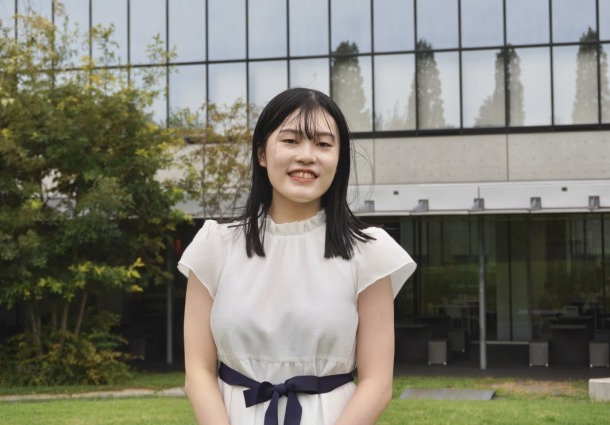
At Toyama Campus Toyama Hill
In 2021, Yuki Kato won the first prize at the 57th All-Japan Women's Student Honinbo Championship, which determines the best female student Go player in Japan, and was crowned the Female Student Honinbo. She started playing Go at a young age and has demonstrated her talent by winning titles in various tournaments. In January 2023, she passed the Special Recruitment Examination for Women's Go Players with the highest ranking, and is currently a professional female shogi player, balancing her university life with her studies. We spoke to Kato, who is expected to have a bright future, about what motivated her to start playing Go and become a professional, the difficulties she faced, and her future prospects.
-First of all, please tell us how you started playing Go.
I started playing Go when I was 4 or 5 years old. I've always had a competitive nature, so my parents, who knew that well, encouraged me to take up Go, thinking that I might be suited to competitive activities. When I moved to Nagoya as a first-grader, I was influenced by the manga "Hikaru no Go" (Shueisha), and began to visit a nearby Go club where Go players gathered.
At the time, I was also attending a class called "Nakamura Honinbo" where other students aspiring to become professionals gathered, and in this competitive environment where we all honed our skills, by the time I was in the second year of junior high school, I too was aiming to become a professional Go player.
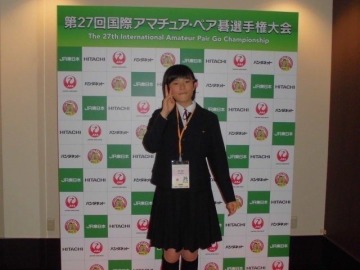
She participated in the world championships when she was a junior high school student.
--Please tell us about your first victory in the All-Japan Women's Student Honinbo Championship when you were a freshman in college.
I remember feeling relieved, because I thought I couldn't become a professional unless I won this tournament. In the final, I was at a disadvantage until the end, but I made a move that made the situation more complicated, and was able to turn the tide. I was happy when a friend who is a professional player watched the game and said, "That was a good move."
The most nervous I've ever been was when I won a national tournament in high school, but I think that experience gave me the mental strength to withstand intense pressure and enabled me to pull off a come-from-behind victory.
--After that, how did you become a professional shogi player? Are there any other memorable events in your competitive career?
The age limit for taking the professional Go exam is 22 years old, so I've been trying since I was in junior high school, when I decided to become a professional. From July of my second year of university, I started attending the prestigious Go dojo "Hon Dojo" in Tokyo, where I was able to improve my skills to a higher level by focusing on practicing checkmate Go. As a result, I was able to give it my all and pass the professional exam in January of my second year of university, which I believe was a great experience that helped me grow. When I passed the professional exam, I received many congratulatory messages from my family, friends, and the teachers at the dojo.
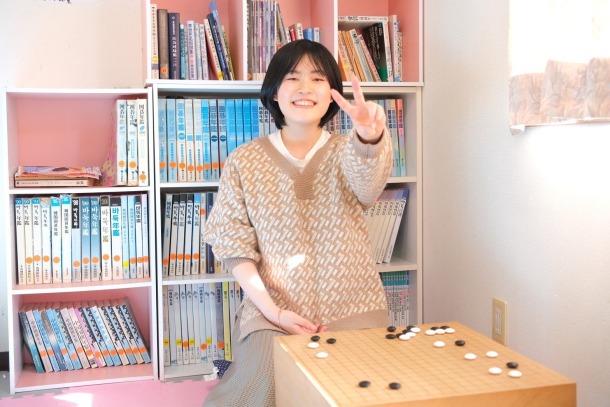
In January of her second year at university, after passing the professional exam, at Hong Dojo.
--Please tell us why you decided to study at School of Social Sciences at Waseda University and what you are glad about by doing so.
I had originally decided that if I couldn't become a professional shogi player by the time I was in my second year of high school, I would go on to university. The professional exam is held every winter, so I chose to take the exam through self-recommendation so that my university entrance exams would not overlap with the professional exams in my third year of high school.
The reason I chose School of Social Sciences was largely due to the presence of my senior shogi player, Ryo Ichiriki, who graduated from the same faculty and won numerous titles, even becoming world champion. Also, at the time I hadn't decided what field I wanted to study, so I chose School of Social Sciences because I thought I could learn about a wide range of fields. After enrolling, I took a law class, and I was able to learn about fields I had no interest in, such as realizing how interesting the constitutional system is, and I think it was good that my world was broadened.

She says that being able to study geography, which she was interested in, was also a deciding factor in her choosing School of Social Sciences
-How have you managed to balance your Go activities with your studies?
Since I became a pro, I have tried to avoid having classes on Mondays and Thursdays, and to study efficiently by taking on-demand classes. The most difficult period was when I took the pro exam in January of my first and second years of university. The university reports and final exams overlapped, so I made sure to write the reports by December when the assignments were announced, and I got through it. There are very few Go players of my generation who attend university, so I sometimes worried that I would not be able to study Go and would fall behind. However, even at times like that, I was able to work hard thanks to the support of my grandparents who lived with me and supported me in my daily life after moving to Tokyo, and my mother who would call me to encourage me when I was feeling down after losing a game, and other family members.
--Please tell us about your future prospects.
I plan to graduate in March 2025, so I think I will have more time to devote to Go than before. It's been about a year since I became a professional, but I still feel that I lack in many areas, so I would like to work harder on practice and research with the goal of winning one of the five major women's titles. Although I was unfortunately defeated at the world championships in Korea that I participated in the other day, the fact that I was able to beat a player who was more advanced than me in the qualifying rounds gave me a lot of confidence as I consider my future professional activities.
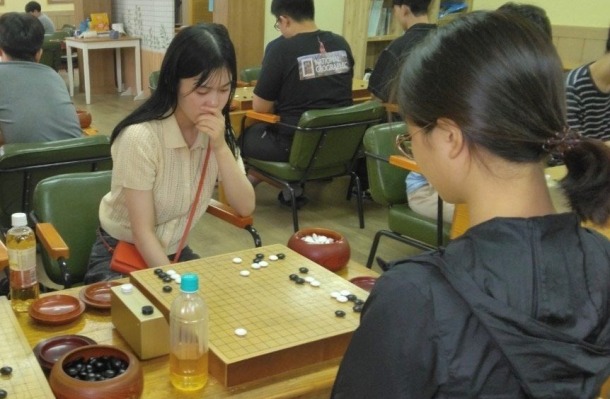
She (left) will travel to Korea for the world championships in August 2024.
I've studied a variety of subjects at Waseda University, so I'm not sure how I'll be able to use what I've learned, but I'd like to contribute to the activities of the Nihon Ki-in, an organization that supports the Japanese Go world. Also, I like children, so I'd like to be involved in activities to teach Go to children in the future.
No.881
Interview, text and photography: Waseda Weekly Reporter (SJC student staff)
Sotaro Tsutsumi 4th year student School of Social Sciences
【Profile】
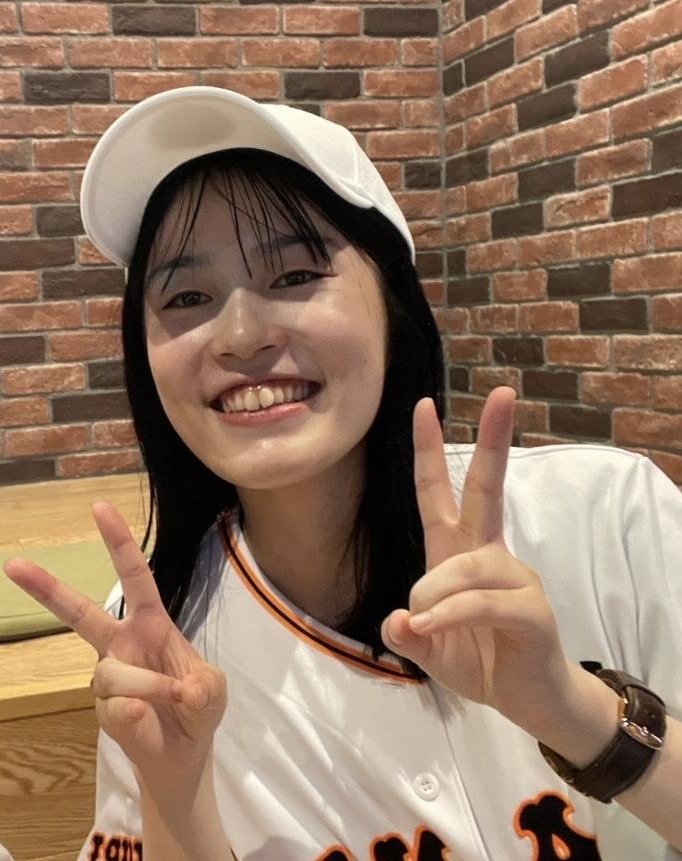
She is wearing a Yomiuri Giants uniform
Born in Tokyo. Graduated from Nagoya University Affiliated Upper and Lower Secondary Schools. Her hobbies are reading books and manga. Since entering university, she has been reading novels by Haruki Murakami and Kotaro Isaka. Other hobbies include playing the piano and going for walks. Her current hobby is watching baseball games, and she often goes to cheer on the Yomiuri Giants. Apparently, she was classmates with shogi player Sota Fujii in junior high and high school.

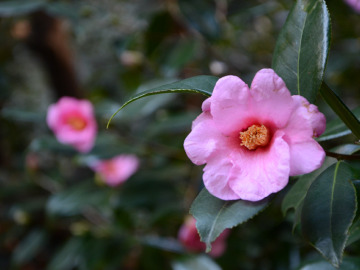
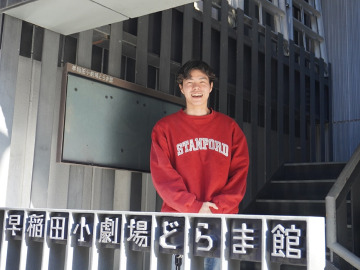
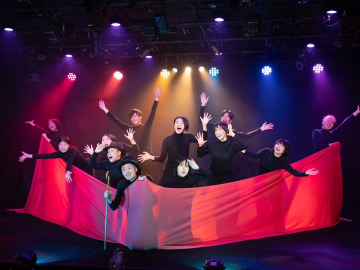
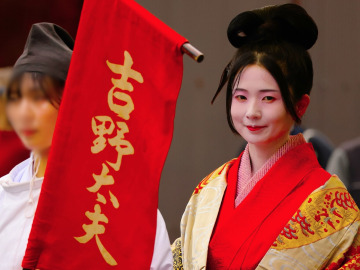

![[Save version] Map of the four main campuses](https://www.waseda.jp/inst/weekly/assets/uploads/2025/09/17cb2975123fc5103172ef60bd98608d-610x458.jpg)

